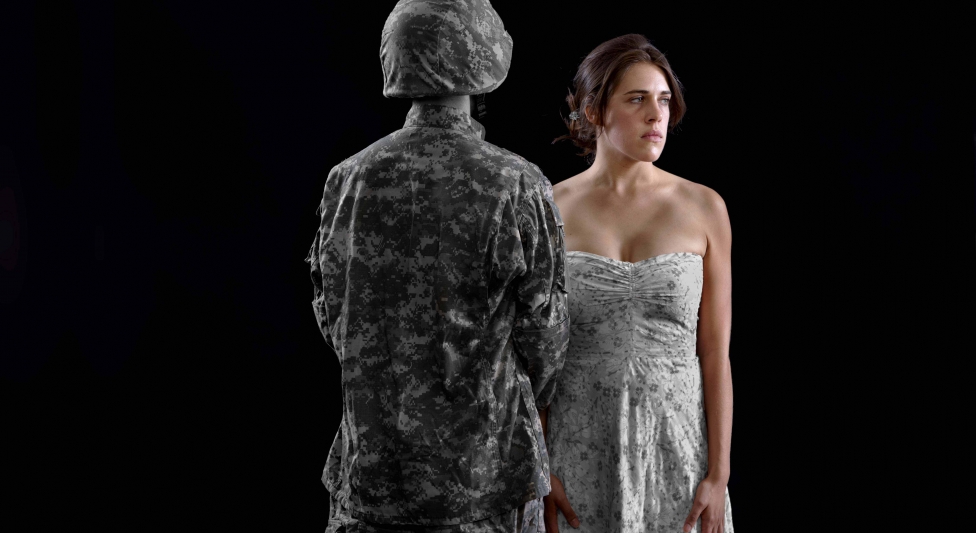
Word for Word's production of Siobhan Fallon's You Know When the Men Are Gone. Ryan Tasker and Roselyn Hallett. (Photo by Mark Leialoha.)
"And now here she was, everything Kit wanted, the only person who could figure out how to make something good of his situation, and she was there in another bed, as far away as she had been before he stepped onto the plane. Kit tried to sit, feeling around on the bedside table for the TV remote. He either wanted to throw it at Helena's head, as hard as only a Lincoln High MVP pitcher could, or click on the TV. The impulse to remain a functioning part of society won... [S]he slept on and Kit watched cheetahs hunting on PBS, the twist and somersault as they brought an antelope down and then tore it into bloody bits."
-- "The Last Stand," You Know When the Men Are Gone, Siobhan Fallon
Its title deceptively banal, Siobhan Fallon's collection of short stories about the impact of modern-day deployment on the men and women of the U.S. military, and on their families, is quietly explosive. The storylines are not particularly original but the story-telling, by the wife of an active-duty U.S. Army officer, is. Eavesdropping on the minute, often intimate, details of the lives of the servicemen and their wives, You Know When the Men Are Gone sidesteps the political proselytizing and the melodrama of so many contemporary accounts -- it feels authentic, unadorned, as disciplined as the military culture itself. Now through February 24, San Francisco theater company Word for Word ignites two of the stories onstage in a gripping production that puts the entire text into the mouths of six actors, amping up Fallon's spare, taut prose.
"The Last Stand" and "Gold Star" are the most tightly written of the collection. In the deft hands of directors Joel Mullennix ("Last Stand") and Amy Kossow ("Gold Star"), narration and dialogue are parceled out to various characters or at times to a chorus, certain passages are enacted literally, others are simply narrated. This inventive handling of the text underscores by turns the awkwardness, the tragedy, the irony, or the ludicrousness of the moment.
The narration of the above passage, for example, is accompanied by a portrayal of the cheetah-antelope chase, eliciting both chuckles and gasps from the audience at the wartime parallel.
One character links the two stories, 21-year-old specialist Kit Murphy, maimed in combat in Iraq and returning home to his now-indifferent wife and to the widow of the sergeant who had saved his life when an IED hit their Humvee. Juxtaposed, these two stories create a satisfying arc, and contain dramatic resolutions that the other stories in the collection do not.
One longs to see the staging of the remaining stories in You Know When the Men Are Gone, all riveting in different ways. Perhaps the success of last year's six-hour staging of The Great Gatsby by the Elevator Repair Service (Gatz) will encourage a producer to take on the challenge.
As the United States wearies of its long-drawn-out engagement in the Middle East, the tragic consequences of a failure to reintegrate veterans, especially the wounded, appear to be mounting. The murder of ex-Navy SEAL Chris Kyle and the disgraceful treatment of the ex-SEAL who took down Osama Bin Laden are but two recent painful illustrations. Siobhan Fallon's stories are a chilling reminder that the collateral damage includes spouses and families.
"In the first weeks after Eddie's death, there had been visitors, soldiers who came to her apartment and sat uncomfortably on the edge of her chairs. She almost hated the smooth-faced boys, each one of them alive, able to run their five-mile physical training at dawn, go to a Burger King drive-through, catch a movie, get picked up for a DUI. Able to do anything. They seemed to sense her blame, never accepting her offers of coffee or potato chips, afraid to look her in the eye, rarely speaking to her other than the army requisite "ma'am." But they stayed in her home for hours, waiting to be relieved by another soldier, as if acting on direct orders from their chain of command to keep guard. She knew they were there to ensure that she didn't starve to death or slit her wrists in the shower; they also ensured that she didn't stay in her bedroom with the covers over her head, weeping and compulsively remembering every moment of Eddie that she could. She had to exist because the soldiers sat on her couch and watched Fox News. They had known her husband, how disciplined and focused he was, and so she changed her clothes each day, vacuumed the rugs, wiped cola spills off the countertops."
- "Gold Star," You Know When the Men Are Gone, Siobhan Fallon
Catch Word for Word's You Know When the Men Are Gone: two short stories "The Last Stand" and "Gold Star" through February 24th at Z SPACE, 450 Florida Street, San Francisco.
Performances: Wednesday-Thursday 7 pm, Friday-Saturday 8 pm, and Sunday 3 pm.
And don't miss "An Evening with Siobhan Fallon" on Saturday February 16th at 8 pm, an onstage conversation and reception with Siobhan Fallon, following a performance of You Know When the Men Are Gone.
Tickets: Wednesday - Thursday $30; Friday - Sunday $40; Feb 16th Author Night $55, with a $5 student/senior discount.
Tickets available: www.zspace.org
